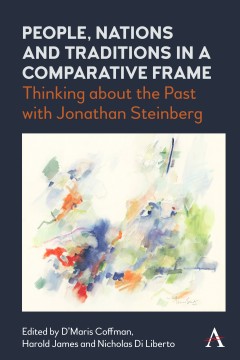People, Nations and Traditions in a Comparative Frame
Thinking about the Past with Jonathan Steinberg
Edited by D’Maris Coffman
Harold James
Nicholas Di Liberto
Other Formats Available:
E-Book- About This Book
- Reviews
- Author Information
- Series
- Table of Contents
- Links
- Podcasts
About This Book
The diverse essays in this book reflect Jonathan Steinberg’s methodological pluralism and insatiable curiosity for historical questions which cross disciplinary and geographical boundaries. Animating students, colleagues, friends and wider audiences with his enthusiasm for ‘thinking about the past’ was his vocation, one that he pursued with unmatched enthusiasm. Through this collection of essays, the book hopes to convey something of the intellectual range, analytical purchase and moral purpose of his historical writing and teaching.
One feature of Steinberg’s inspiring and charismatic lectures was his unique ability to combine an analysis – always fresh, never pre-cooked – of big historical structures and trends with an acute awareness of the importance of individual personalities. Jonathan Steinberg also believed in contingency, the importance of chance, and was keen to reject any form of historical determinism. The third salient feature of his work was his sense of moral purpose. He understood history as a hermeneutic science and was appropriately cautious about the epistemological status of historical claims, but he nevertheless saw the correctness of historical arguments and the probity of historical claims to be moral as well as empirical questions. His ethical sensibilities, his openness to interdisciplinary work and the humane and nuanced understanding of human motivation equipped him to tackle some of the most difficult subjects of nineteenth- and twentieth-century European history.
Reviews
‘A rich collection of essays, whose diversity testifies to the intellectual curiosity and deep humanity of a remarkable scholar and teacher.’ — David Reynolds, Professor Emeritus of International History, Cambridge University, UK
Author Information
D’Maris Coffman is Professor of Economics and Finance and the Head of Department and Director of the Bartlett School of Construction and Project Management at University College London.
Harold James, the Claude and Lore Kelly Professor in European Studies at Princeton University, is Professor of History and International Affairs at the Woodrow Wilson School and Director of the Program in Contemporary European Politics and Society.
Nicholas Di Liberto is president of the Southeast World History Association and associate editor of the World History Bulletin. He works now as a freelance editor.
Series
Table of Contents
Preface – Zara Steiner; Acknowledgements; Introduction; I. Methodological Pluralism and New Applications; 1. All or Nothing: From Comparative to Transnational History – Ben Mercer; 2. Swiss History Only as National History? How to Break out of the Cage of National Historiography – Georg Kreis; 3. ‘The Kaiser’s Navy and German Society’: The View from the Tattooist’s Studio – Jane Caplan; 4.The Warburgs and Yesterday’s Financial Deterrent – Harold James; II. Personal and National Character; 5.Clarendon’s Exile and the Role of Personality in Historical Explanation – D’Maris Coffman; 6.Leslie Stephen and the Americans – Michael O’Brien; 7. From Bodyguard to General: The Strange Career of Joseph ‘Sepp’ Dietrich – Christopher Clark; 8.Johnny Eyetie and the Teds: British Soldiers’ Attitudes towards their Italian and German Enemies in the Second World War – Alan Allport; III. Society, Families and the Sovereign Self; 9. The Family of Sovereigns at Modern Times – Tara J. Westover; 10. French Family Policy and the Family of Nations in the Interwar Years – Kristen Stromberg Childers; 11.Death of a Dream: Liberal Values and the Crisis of the British Welfare State, 1945–2014 – Harold Carter; IV. History Out of Sync: Modernity and Tradition; 12. A Risorgimento Influence on the Modern European Image of St Francis of Assisi – J. Casey Hammond; 13. Hometown Hamburg: Constructing the Non-Liberal and Non-Modern Foundations of the Weimar Republic in the Long Nineteenth Century – Frank Domurad; 14. ‘Revolt Against the Modern World’: Religion and the Fascist Right in Contemporary Italy – John Pollard; V. History, Narrative and the Human Condition; 15. April 1945: Life and Death in the Last Days of World War II – Thomas Childers; 16. Being Human as a Method and Research Finding in Social Science – Alison Liebling and João Costa; 17. Bleak House Syndrome – Joanna Wade; Afterward – David Bell; Bibliography of Jonathan Steinberg’s Works; Index.
Links
Stay Updated
Information
Latest Tweets



